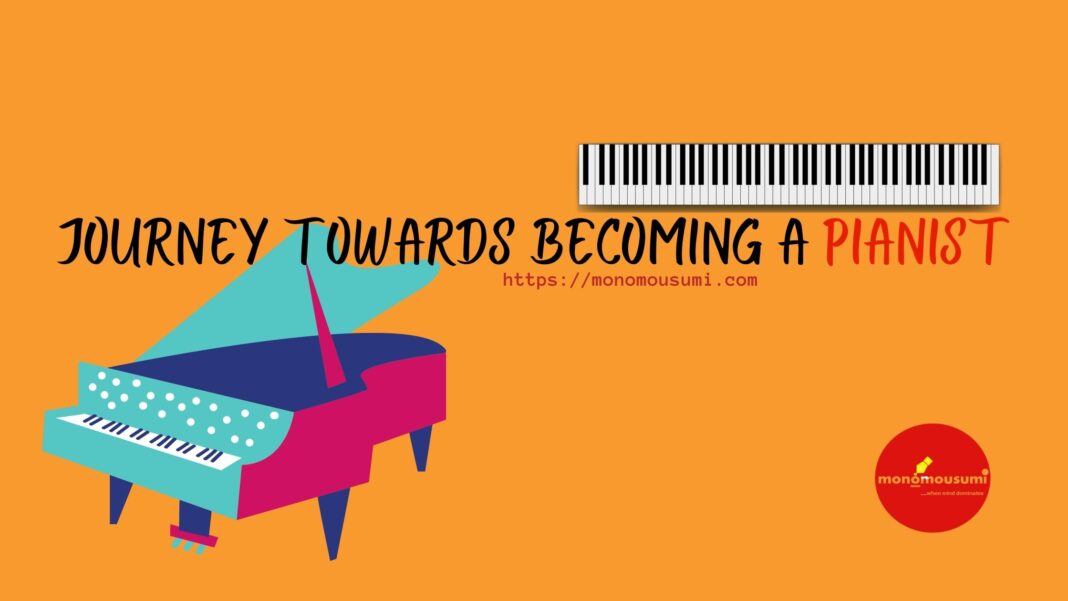“I believe in using the entire piano as a single instrument capable of expressing every possible musical idea.” -Oscar Peterson
Many children go running around, jumping from one class to another, and one of these is a music class. But have you ever wondered how it would be to have it as a career? Many people do not consider careers in music because it might seem like a competitive field filled with uncertainty. While that can be true, many pianists can find full-time work to sustain themselves and their families.
There are many benefits to playing the piano, for one, when you’re playing the piano, you have to focus on the rhythm, pitch, tempo, note duration, and numerous other things. Even though you’re doing something you enjoy, this is a multi-level concentration exercise. Playing a musical instrument is perhaps the only activity during which almost all brain areas are activated simultaneously. While you learn and play songs, the stimulated areas of your brain become larger and therefore more active. The areas that are responsible for the storage of audio information, particularly, are more matured in musicians than in non-musicians.
Practicing frequently and working hard will teach you how to be determined and also lead a disciplined life. Maybe in the beginning it will be harder for you but slowly but surely, you will get used to it, and being disciplined about your practice time won’t be difficult at all.
As a professional pianist, you can perform as a solo act, with singers and musicians, or as part of a band or orchestra. Professional pianists typically start learning how to play at an early age and later focus on a particular style, like classical or jazz piano. You’ll need to practice regularly and have polished pieces ready for auditions and, you may need to travel to performance venues or work in a studio. Key skills for professional pianists include musical talent, discipline, perseverance, and creativity. They should also have the confidence necessary to perform in public.
Before enrolling in a bachelor’s degree program, an aspiring pianist needs to begin practicing at an early age and get his/or basics right. Piano teachers can help their students learn how to play the instrument, interpret music and learn music theory, and encourage them to build a regular practice plan. Aspiring pianists should also have practice performing in front of an audience as this would help them later on in their careers and help them grow as musicians.
Careers in Music:
1) Teaching
Teaching may be a good option for many people who want to teach and inspire others to play the piano. There are several settings where one could teach:
· Local piano studio
· In your own home
· traveling to students’ homes
· High school piano lab
· College piano lab or private lessons
Teaching piano is a very accessible job. Although you don’t need any specific degrees or certifications to teach private piano lessons independently, you do need to be qualified to teach in a school or college setting.
Piano teachers need to have good piano skills, a creative approach to piano teaching and good business sense to make the most out of this career.
If you’re teaching for someone else’s studio, you will likely earn a share of what students are paying for lessons. If you offer lessons individually, you have complete control over how much to charge. You could teach music classes in daycares or primary schools.
2) Accompanying
You could become an accompanist, and use your piano skills to play at:
· Churches
· Schools
· Dance schools
· Community choirs
· Vocal and instrumental lessons
· Rehearsals for musicals and other productions
· Vocal and instrumental competitions and festivals
Accompanying requires you to have excellent sight-reading skills. You also have to be able to adapt quickly and think on the spot, since sometimes you would would get music sheets on the spot and be required to play them. Some of these jobs are ongoing and others are seasonal. These jobs usually have a pre-determined pay that is hourly or salaried.
Accompanying for competitions and festivals would be more inconsistent. The students usually might need an accompanist the day of a competition, or require rehearsal with the accompanist for several weeks leading up to their competition. Thus, you need to be a quick learner as well.
3) Concert Pianist
Performing is probably the most competitive of these jobs, since this is the field most pianists enter. Concert pianists perform at a very high level and are required to have a strong repertoire. They are talented and put in many years of work to earn the opportunity of performing in big concert venues.
On a smaller scale, there are many opportunities to perform in local communities like for programs. Most restaurants, stores or malls may have pianists or small musical ensembles who perform for their guests/customers.
Pianists are also often needed for special events such as weddings, receptions and parties for background music or performances. Piano performers need to play with exceptional artistry and skill. They need to create a name for themselves and have the reputation of being an excellent performer, which takes years. There is a huge range of pay for piano performers depending on experience, the venue and the nature of the performance.
Of these three career paths, most pianists probably do some combination of all three of these jobs in some capacity.
4) Composer
If you love creating your music, there may be occasions to compose music for a living. Video game music, soundtracks, and some commissioned work, are some types of music that you could compose.
Piano is a really versatile and provides many opportunities for income. However, it’s always a good idea to expand your skill set to broaden your options even more. For example, if you have some conducting skills, you could be an accompanist and leader of a choral group.
Another nice aspect of the jobs we discussed is that many of the can be part-time that fit well with busy seasons of life or other career endeavors. Piano jobs can be challenging, satisfying and interesting. If you love playing the piano, there are a lot of different options for you!
By Richa Maria, Mumbai










